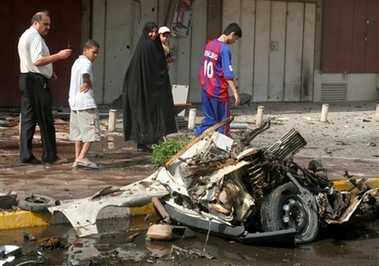BAGHDAD, Iraq - Eleven more U.S. troops were slain in combat, the military
said Wednesday, putting October on track to be the deadliest month for U.S.
forces since the siege of Fallujah nearly two years ago.
The military says the sharp increase in U.S. casualties - 70 so far this
month - is tied to Ramadan and a security crackdown that has left American
forces more vulnerable to attack in Baghdad and its suburbs. Muslim tenets hold
that fighting a foreign occupation force during Islam's holy month puts a
believer especially close to God.

Iraqis walk past a car bomb wreck in Baghdad,
Iraq, Wednesday Oct. 18, 2006. [AP] |
As the
death toll climbed for both U.S. forces and Iraqi civilians, who are being
killed at a rate of 43 a day, the country's Shiite-dominated government remained
under intense U.S. pressure to shut down Shiite militias.
Some members of the armed groups have fractured into uncontrolled, roaming
death squads out for revenge against Sunni Arabs, the Muslim minority in
Iraq who were politically and socially dominant until the fall of
Saddam Hussein.
There have been growing signs in recent days of mounting strain between
Washington and the wobbly government of Prime Minister Nouri al-Maliki, who felt
compelled during a conversation with
President Bush this week to seek
his assurances that the Americans were not going to dump him.
Foreign Minister Hoshyar Zebari on Wednesday blamed American officials who
ran Iraq before its own government took nominal control for bringing the country
to the present state of chaos.
"Had our friends listened to us, we would not be where we are today," Zebari
said in an interview with The Associated Press.
Asked which friends he was referring to, Zebari said:
"The Americans, the Coalition (Provision Authority), the British. OK? Because
they didn't listen to us. The did exactly what they wanted to do. ... Had they
listened to us, we would have been someplace else (by now), really."
It was an unusually harsh statement from Zebari, a Kurd, whose ethnic group
owes much to the U.S. intervention in Iraq and for its virtual autonomy in the
north of the country.
A report in Britain's Financial Times on Wednesday said the White House is
now pressuring Iraqi authorities to give amnesty to Sunni insurgents. That would
be a surprising change for the Bush administration, which has resisted amnesty
because it could potentially include fighters who have killed American troops.
At the State Department, spokesman Tom Casey said a decision on amnesty would
be left to the Iraqi government.
| 1 | 2 |  |